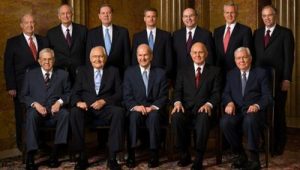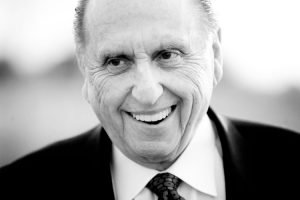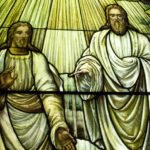Articles of Faith Part Six: The Organization of Christ’s Church
 This piece is the sixth in a series on the thirteen Articles of Faith. In the early days of the Church, a newspaper editor named John Wentworth wrote to the Prophet Joseph Smith asking about Mormon beliefs. Joseph responded with a list of thirteen fundamental doctrines which we call The Articles of Faith. During this series we will explore each Article of Faith as well as its significance and application in the lives of church members.
This piece is the sixth in a series on the thirteen Articles of Faith. In the early days of the Church, a newspaper editor named John Wentworth wrote to the Prophet Joseph Smith asking about Mormon beliefs. Joseph responded with a list of thirteen fundamental doctrines which we call The Articles of Faith. During this series we will explore each Article of Faith as well as its significance and application in the lives of church members.
Article of Faith 6: We believe in the same organization that existed in the Primitive Church, namely, apostles, prophets, pastors, teachers, evangelists, and so forth.
Christ’s Organization
As we’ve hinted at in previous articles, the restored Church follows patterns established by Christ’s original organization during his life on earth. We discussed in our last installment that order and organization matters to Heavenly Father. As such, His Church is set up with specific offices and ways of operating.
This organization hasn’t changed since the days of Christ. In fact, nearly the same phrase used in the Article of Faith can be found in New Testament—
Ephesians 4;11 And he gave some, apostles; and some, prophets; and some, evangelists; and some, pastors and teachers….
Apostles
 The word “apostle” means “One sent forth”— as in, sent forth to testify. One of the foremost duties of an Apostle is to testify of Christ. During Christ’s ministry, He called upon twelve of His disciples to fill these priesthood offices. Many of His Apostles had been fishermen by trade, so when Christ called them to the ministry He said, “Follow me, and I will make you fishers of men.” (Matthew 4:19). In other words, he would give them the power and responsibility to bring people unto Christ.
The word “apostle” means “One sent forth”— as in, sent forth to testify. One of the foremost duties of an Apostle is to testify of Christ. During Christ’s ministry, He called upon twelve of His disciples to fill these priesthood offices. Many of His Apostles had been fishermen by trade, so when Christ called them to the ministry He said, “Follow me, and I will make you fishers of men.” (Matthew 4:19). In other words, he would give them the power and responsibility to bring people unto Christ.
Today, twelve living Apostles make up the council which assists the prophet in leading the Church. They regularly travel abroad to testify of Christ and His gospel, just as the Apostles of old did. They speak to the world-wide church during General conference and give us counsel and direction from Heavenly Father.
Prophets
 The Prophet is the head of the Church. He receives revelation from Father in Heaven and communicates that to the people of His church. He also holds all of the keys of the Priesthood and is the only person on earth entitled to use all of them. Before His death, Christ appointed the Apostle Peter to lead the Church in his stead.
The Prophet is the head of the Church. He receives revelation from Father in Heaven and communicates that to the people of His church. He also holds all of the keys of the Priesthood and is the only person on earth entitled to use all of them. Before His death, Christ appointed the Apostle Peter to lead the Church in his stead.
Matthew 16: 18, 19: “And I say also unto thee, That thou art Peter, and upon this rock I will build my church; and the gates of hell shall not prevail against it.
And I will give unto thee the keys of the kingdom of heaven: and whatsoever thou shalt bind on earth shall be bound in heaven: and whatsoever thou shalt loose on earth shall be loosed in heaven.”
Joseph Smith was the first to hold this sacred office in the latter-days. Since then a succession of worthy men have been called of God and ordained to this highest priesthood calling. Because of this, God’s people have never been without the blessings of the priesthood or modern-day revelation since the restoration.
Pastors

Though the word “pastor” is rarely used in the modern church, the responsibilities of bishops and other local leaders fall into this category. In fact, the footnote on the word “pastor” leads you to the Topical Guide reference for “Bishop,” because the words mean roughly the same thing.
The word Pastor comes from the Middle English word for “shepherd.” Significantly, the metaphor of a shepherd and his flock pops up all over the scriptures. Christ was known as “the good shepherd” and he instructed Peter to “feed [his] sheep.”
Luke15:4 Tells us how important Christ’s people are to him using a shepherd analogy.
What man of you, having an hundred sheep, if he lose one of them, doth not leave the ninety and nine in the wilderness, and
go after that which is lost, until he find it?
This symbol of a Shepherd caring for his flock exemplifies the type of care a Bishop should give his ward. Love, guidance and spiritual “feeding” go hand in hand with being a “pastor” in the Lord’s Church.
Teachers
The word Teachers applies in two different ways. Of course, many of us may hold teaching callings in church organizations. Additionally, Teacher is an office of the Aaronic Priesthood which allows young men to prepare and bless the sacrament, become home teachers and officiate in various other priesthood ordinances. Christ was the greatest teacher and held those priesthood powers and more. His example to us can guide us in performing the duties of a teacher.
Evangelists
According to the guide to the scriptures, “An evangelist is one who bears or proclaims the good news of the gospel of Jesus Christ”
good news of the gospel of Jesus Christ”
This description can apply to many positions in the Church. Missionaries may come to mind first. Truly missionaries proclaim the gospel as their primary job, but modern revelation tells us that Patriarchs are “evangelical ministers”. Patriarchal blessings bear personal witness to an individual, therefore patriarchs are evangelists who minister to the one. Read more about the role of Patriarchs as evangelists in the New Testament Student Manual and The Guide to the Scriptures.
The Take-Away
During his earthly life Christ established the proper organization of His church. During the Restoration, Joseph received revelation on how to bring back that same order to the modern church. The offices mentioned in this article have a divine origin and as such, remain a part of the restored gospel to this day.
Check out the other articles in this series and tell us your thoughts in the comments below.



